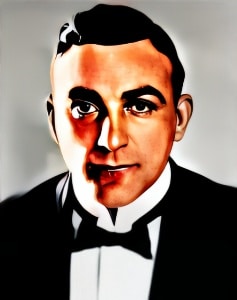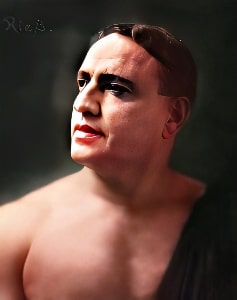 Elmo Lincoln (1889-1952) was an American actor, best known for his portrayal of the iconic character Tarzan in the 1918 silent film “Tarzan of the Apes.”
Elmo Lincoln (1889-1952) was an American actor, best known for his portrayal of the iconic character Tarzan in the 1918 silent film “Tarzan of the Apes.”
Born as Otto Elmo Linkenhelt on February 6, 1889, in Rochester, Indiana, Lincoln’s acting career spanned both the silent and early sound film eras, and his portrayal of Tarzan solidified his place in cinematic history.
Lincoln’s journey into the world of entertainment was marked by versatility and determination. Before finding fame as Tarzan, he appeared in a variety of film roles, showcasing his ability to adapt to different genres and characters. His early experience in films laid the foundation for his later success.
However, it was his iconic role as Tarzan that would forever be associated with Elmo Lincoln. “ Tarzan of the Apes,” directed by Scott Sidney, was one of the earliest film adaptations of Edgar Rice Burroughs’ beloved character. In the film, Lincoln’s portrayal of Tarzan captured the essence of the jungle hero—his physical prowess, agility, and primal instincts.
As Tarzan, Lincoln was a natural fit, using his physicality and athleticism to bring the character to life. He demonstrated remarkable agility, including his ability to swing from vines and trees, a hallmark of the character. His Tarzan was a man of the jungle, raised by apes, and his interactions with the wild creatures were both authentic and endearing.
One of the film’s memorable elements is the romantic subplot between Tarzan and Jane Porter, portrayed by actress Enid Markey. The film explores the deepening connection between the two characters, despite the language barrier. Elmo Lincoln’s ability to convey emotion and strength through his physical acting added depth to the character and heightened the film’s emotional impact.
“ Tarzan of the Apes” was a significant success, helping to popularize the Tarzan character in both film and literature. The film was noted for its visual storytelling, relying on the actors’ expressions and actions to convey the narrative, as was common in silent cinema. The film’s impact on popular culture and the enduring legacy of the Tarzan character are largely attributed to Lincoln’s portrayal.
After his success as Tarzan, Elmo Lincoln continued to work in the film industry. While he never quite achieved the same level of fame as with his iconic role, he remained active in the evolving film landscape. The transition to sound films brought new challenges, and Lincoln adapted to the changing industry, albeit with less visibility than during the silent era.
Elmo Lincoln’s career in cinema spanned several decades, from the early days of silent films to the early sound era. His contribution to the world of film, particularly his portrayal of Tarzan, remains a significant part of the history of cinema and the enduring appeal of classic characters in literature.
In addition to his film career, Lincoln also ventured into other aspects of entertainment, including stage performances and writing. His work in the entertainment industry highlighted his adaptability and determination as an actor.
Elmo Lincoln passed away on June 27, 1952, leaving behind a legacy that continues to be celebrated by fans of the Tarzan character and early cinema enthusiasts. His iconic portrayal of Tarzan remains an enduring part of cinematic history and serves as a testament to the power of film to capture the imagination and create beloved characters.
Loading live eBay listings...




